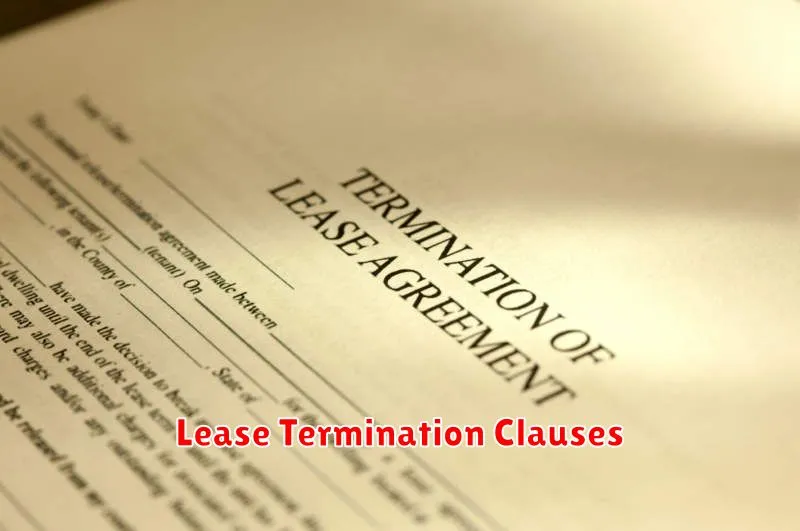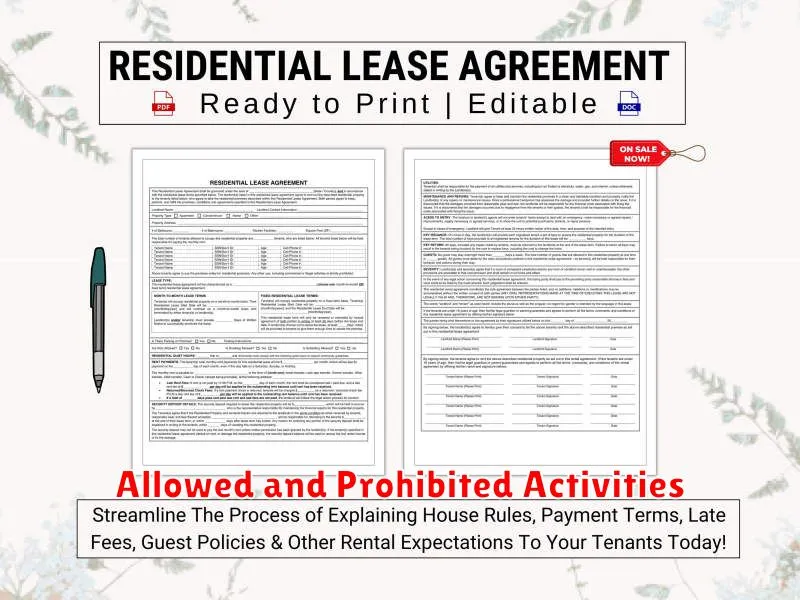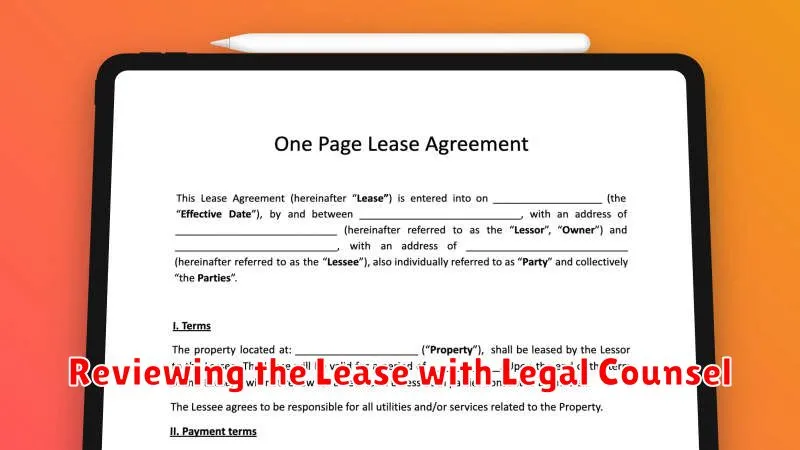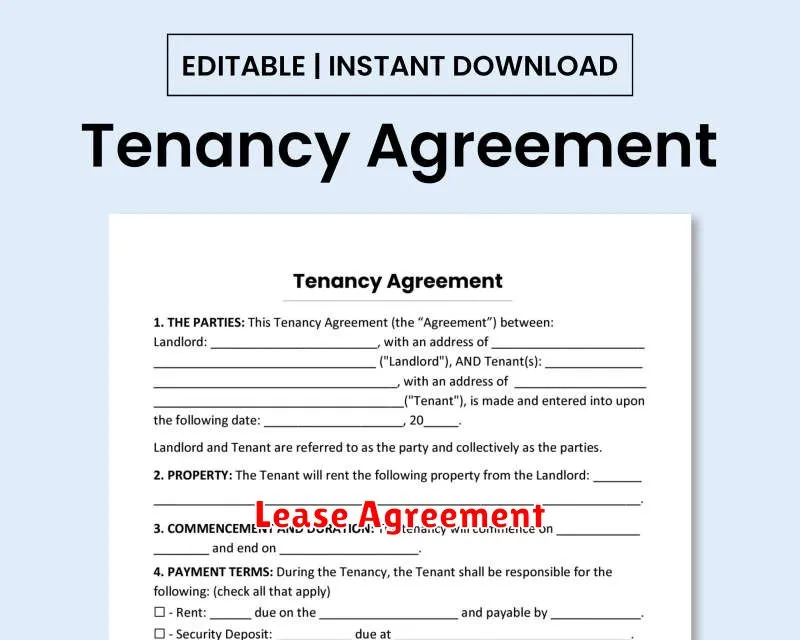Moving into a new apartment is an exciting time, but it’s also important to understand the terms of your lease agreement. A lease is a legally binding contract, and failing to understand the terms can lead to unexpected costs, penalties, or even eviction. This article will cover some of the most important apartment lease terms you should know before signing on the dotted line. From understanding your responsibilities as a tenant to knowing your rights, this guide will help you navigate the often confusing world of apartment leases and make sure you are fully prepared for your new living situation.
The Importance of Reading the Lease Thoroughly
When you sign a lease for an apartment, you are agreeing to abide by the terms and conditions outlined in the document. It’s easy to feel overwhelmed by the length and legalese, but it’s important to understand what you are signing up for. Reading the lease thoroughly is crucial for ensuring a smooth and positive rental experience.
The lease agreement spells out the rights and responsibilities of both the landlord and tenant. It outlines the monthly rent amount, the duration of the lease, and the terms for breaking the lease. It also includes information about pet policies, parking, and utilities, as well as any restrictions on using the apartment or the building.
Failing to read the lease thoroughly can lead to unexpected costs, penalties, or conflicts. You might discover you have to pay for utilities you didn’t expect, that you’re prohibited from having certain types of pets, or that there are specific regulations about noise levels or guest access. By understanding the terms of the lease, you can avoid these problems and ensure a positive rental experience.
Take the time to read your lease carefully and ask questions about anything you don’t understand. This will help you understand your rights and obligations as a tenant and prevent future complications.
Understanding Lease Duration and Renewal Options
The lease duration, or lease term, defines the period you agree to rent an apartment. Common durations include 6, 12, or 18 months. It’s crucial to understand that the lease binds both you and the landlord, meaning you’re legally obligated to pay rent for the full term. While you may find an apartment you love, always factor in the duration to make sure it aligns with your plans.
After your initial lease term expires, you have several options:
- Renewal: You can renew the lease for an additional term, usually under the same terms as the original lease. However, landlords may raise the rent or change other lease conditions during the renewal process.
- Termination: If you choose not to renew, you’ll need to notify your landlord in writing by the specified deadline, typically 30-60 days before the lease ends. Failing to do so could result in additional fees or penalties.
- Month-to-month: In some cases, your lease might transition into a month-to-month agreement after the initial term. This allows you to remain in the apartment but offers more flexibility with a shorter lease commitment.
Always read your lease agreement carefully and understand your rights and responsibilities regarding renewals and termination. If you’re unsure about any aspect of your lease, don’t hesitate to ask your landlord for clarification.
Rent Amount, Due Date, and Late Fees
The rent amount is the amount of money you’re obligated to pay your landlord each month for the right to live in your apartment. The due date is the date by which you must pay your rent to avoid late fees. This information is usually clearly stated in your lease agreement. It’s crucial to understand these terms and pay your rent on time to avoid any issues with your landlord.
Late fees are penalties charged by your landlord when you don’t pay your rent by the due date. These fees can vary depending on the lease agreement and your state’s laws, but they can quickly add up. It’s best to set reminders for your rent due date and always try to pay on time. Some landlords offer grace periods, so always check your lease agreement for specific information regarding late fees and grace periods.
Security Deposit and Its Return
A security deposit is a sum of money you pay to your landlord at the start of your lease. It’s intended to cover any potential damages you might cause to the apartment during your tenancy. The amount of the security deposit can vary depending on the apartment and location.
Make sure you understand the terms regarding the security deposit before signing your lease. This includes:
- The amount of the security deposit.
- How the security deposit is returned. Will it be sent back by mail, deposited into your bank account, or handed to you in person?
- When the security deposit will be returned. This should be clearly stated in your lease.
- What deductions will be made from the security deposit. These may include charges for unpaid rent, damage to the apartment beyond normal wear and tear, and unpaid utility bills.
It is recommended that you take photos and videos of the apartment’s condition before you move in, documenting any pre-existing damage. This will help you avoid being charged for damages that were already there. When you move out, make sure to clean the apartment thoroughly, and keep the landlord informed of your intentions to move out.
Maintenance and Repair Responsibilities
The maintenance and repair responsibilities section of your lease agreement outlines who is accountable for fixing issues within the apartment. This is crucial for understanding your rights and obligations as a tenant.
Typically, landlords are responsible for addressing major repairs that affect the habitability of the property, such as plumbing, electrical, heating, and cooling systems. This usually applies to issues that arise from normal wear and tear. On the other hand, tenants are generally responsible for minor repairs and damages caused by their own negligence. Examples include clogged drains, broken light bulbs, and damaged furniture.
It is essential to carefully read and understand the specifics of the maintenance and repair section in your lease. Pay close attention to the definition of “normal wear and tear”, as it can be subjective. Additionally, note the procedures for reporting maintenance requests. This may include specific forms, timelines for response, and acceptable methods of communication.
Maintaining a clear understanding of your maintenance and repair responsibilities will prevent any misunderstandings and disputes with your landlord. It will ensure a smoother and more pleasant living experience.
Rules Regarding Pets and Guests
Your lease agreement will likely include a section outlining rules regarding pets and guests. Carefully review these sections to ensure you understand the restrictions and limitations placed on both. Some common rules you might encounter include:
Pet Policies:
- Pet Restrictions: Many apartments have breed restrictions, weight limits, or limitations on the number of pets allowed. Ensure you understand what is permitted and what is not.
- Pet Fees: Pet deposits and monthly pet rent are common. Make sure you are aware of any additional costs associated with having a pet.
- Pet Behavior: Your lease may include rules regarding leashing your dog, cleaning up after your pet, and preventing excessive noise or disturbances caused by your pet.
Guest Policies:
- Guest Limitations: Some leases have restrictions on the duration or frequency of guest stays. You may need to inform the landlord about guests and obtain their approval.
- Guest Parking: If you have limited parking, your lease may outline rules for guest parking, including designated spots or time limits.
- Guest Conduct: Be aware of any rules regarding guest behavior, such as noise levels or unauthorized access to shared amenities.
Utilities and Their Payment
The cost of utilities like water, electricity, gas, trash collection, and internet is often a major expense in apartment living. It’s important to understand how these costs are handled in your lease agreement.
Included Utilities: Some leases include certain utilities in the monthly rent, while others require you to pay them separately. If utilities are included, the lease should explicitly list which ones are covered.
Separate Payment: If utilities are not included, you’ll be responsible for setting up accounts and paying them directly to the utility providers. This means you’ll receive separate bills from the utility companies. Make sure to inquire about the average cost of utilities for the apartment before signing your lease to budget accordingly.
Utility Allowances: Some landlords may offer a “utility allowance,” which is a set amount deducted from your rent to help cover utility costs. However, it’s crucial to understand that the allowance may not fully cover your actual utility expenses, so you may need to pay the difference.
Meter Readings: If you are responsible for paying utilities, you may need to provide your own meter readings to the utility providers for billing purposes. Be sure to understand the process for submitting readings to avoid late fees.
Energy Efficiency: Consider the energy efficiency of the apartment before signing your lease. Choosing an apartment with energy-saving features can help you lower your utility bills.
Lease Termination Clauses

Lease termination clauses are crucial parts of your lease agreement that outline the conditions under which either you or your landlord can end the lease early. Understanding these clauses is vital, as they can significantly impact your rights and obligations.
Early Termination by Tenant: This clause typically covers scenarios where you may break your lease, such as a job relocation, military deployment, or domestic violence. It usually requires you to provide written notice to your landlord and might include a fee or penalty for breaking the lease.
Early Termination by Landlord: Your landlord may have grounds to terminate your lease early, such as non-payment of rent, violation of lease terms, or illegal activities on the property. These clauses often specify a notice period and procedures for eviction.
Breach of Lease: This clause defines what constitutes a breach of the lease agreement, including actions that could lead to early termination. It’s important to be aware of these terms to ensure you don’t inadvertently break your lease.
Notice Requirements: The lease will outline the required notice period for both tenants and landlords in case of early termination. This ensures both parties have sufficient time to prepare for the end of the lease.
Termination Fees: Some lease termination clauses include specific fees associated with early termination. These fees can vary depending on the reason for termination and local regulations.
Reading and understanding the lease termination clauses in your agreement is essential. It helps you understand your rights and obligations regarding early lease termination and can prevent unexpected financial burdens or legal issues.
Understanding Subletting Policies
Before you sign a lease, make sure you understand your landlord’s subletting policies. Subletting is when a tenant rents out their apartment to another person, usually for a shorter term. This can be a good way to make extra money, but it’s important to understand the rules. Not all landlords allow subletting, and those who do often have specific requirements that you must meet.
If you are considering subletting, read your lease carefully and ask your landlord any questions you have. You need to make sure you understand the rules and regulations. If you do not follow the rules, you could face penalties such as eviction or a breach of contract.
Here are some things to keep in mind about subletting policies:
- Landlord Approval: Some landlords may require your permission before you can sublet your unit. This is especially true if the landlord has a specific reason for wanting to approve the subtenant.
- Sublet Fees: Some landlords may charge a fee for subletting. This is usually a small percentage of the rent, but it can vary depending on your landlord.
- Sublet Duration: Most landlords will have a minimum and maximum period of time you can sublet your unit. This is typically based on the duration of your lease.
- Subtenant Qualifications: Landlords might have specific qualifications for subtenants, such as credit checks and background checks. This can vary depending on the landlord and their requirements.
If you plan to sublet your apartment, you need to be clear about your landlord’s requirements. Make sure you have everything in writing and make a copy of your agreement to protect both you and your subtenant.
Parking Regulations and Fees
Understanding parking regulations and fees is crucial when signing an apartment lease. These terms dictate your parking privileges and associated costs, so carefully reviewing them is essential.
Assigned Parking: Some apartments offer assigned parking spaces, guaranteeing you a specific spot. This can be beneficial for convenience and security, but it might come at an extra cost. Be sure to inquire about the location of your assigned space and any fees involved.
Unassigned Parking: In unassigned parking situations, spaces are available on a first-come, first-served basis. This option is typically cheaper but can be inconvenient, especially during peak hours. Factor in the potential hassle of finding a parking spot before making a decision.
Guest Parking: Many apartment complexes have designated areas for guest parking. These spaces are often limited, so familiarize yourself with the rules and regulations regarding guest parking, such as time limits and permit requirements.
Parking Fees: If parking is included in your rent, it’s essential to clarify the terms of this inclusion. Does it cover assigned or unassigned parking? Are there any limitations or restrictions on the number of vehicles you can park? If parking isn’t included, inquire about the monthly or annual fees and whether they cover assigned or unassigned spaces.
Parking Violations: Understand the consequences of violating parking regulations. This may include fines, towing, or even lease termination. Ensure you familiarize yourself with parking rules and adhere to them to avoid penalties.
By understanding the parking regulations and fees outlined in your lease agreement, you can avoid potential issues and ensure a smoother living experience. Be sure to ask any clarifying questions you have before signing the lease.
Insurance Requirements
One of the most important sections in your lease agreement is the insurance requirements section. This section will outline the types of insurance you are required to maintain, along with the minimum coverage amounts. In most cases, you will be required to have renter’s insurance. This insurance will protect your belongings in case of fire, theft, or other disasters. It may also protect you from liability if someone is injured in your apartment.
Be sure to review your lease carefully and understand the specific insurance requirements. You may need to provide proof of insurance to your landlord before you can move in.
Allowed and Prohibited Activities

Your lease agreement will outline specific activities that are permitted and prohibited within your apartment. This section is crucial as it dictates what you can and cannot do in your rental unit. It is vital to carefully review this section and understand the rules.
Allowed activities might include:
- Having guests over
- Making reasonable noise within certain hours
- Using common areas of the apartment building
Prohibited activities could include:
- Illegal activities
- Excessive noise or disturbance
- Pets without permission
- Subleasing the unit without the landlord’s consent
- Making major alterations to the apartment
Violating any of these terms could result in penalties such as fines or even eviction. Make sure you understand the specific rules and regulations outlined in your lease. If you have any questions, don’t hesitate to reach out to your landlord for clarification.
Dispute Resolution Procedures
The dispute resolution procedures section of your lease outlines how you and your landlord will resolve disagreements. This is a crucial part of the lease, as it establishes a formal process for addressing any issues that may arise. Understanding these procedures is essential to protect your rights and ensure a fair resolution.
Your lease will typically outline various steps involved in resolving disputes, such as:
- Notice Requirement: This specifies the manner in which you and your landlord must communicate with each other about the dispute. For instance, it may require written notices or attempts at informal resolution before proceeding to more formal steps.
- Mediation: This involves a neutral third party who helps facilitate a compromise between you and your landlord. Mediation is often a less formal and less costly way to resolve disputes.
- Arbitration: This involves a neutral third party who hears both sides of the dispute and makes a binding decision. Arbitration is typically more formal and may have associated costs.
- Litigation: This is the most formal and potentially expensive option, involving filing a lawsuit in court. It should be considered as a last resort.
Familiarize yourself with the specific dispute resolution procedures outlined in your lease. Knowing how disputes are handled will help you navigate any disagreements with your landlord effectively.
Reviewing the Lease with Legal Counsel

While most lease agreements seem straightforward, there might be clauses that are legally ambiguous or could negatively impact you as a tenant. Therefore, it’s crucial to seek legal advice before signing your lease. A legal professional can help you understand the legalese and identify any potential issues.
Legal counsel can guide you on negotiating favorable terms, such as:
- Security deposit amount and refund procedures
- Early termination clauses and penalties
- Pet policies and restrictions
- Maintenance responsibilities and timelines
- Noise and disturbance regulations
They can also ensure the lease complies with local and state laws, protecting you from potential legal issues. Ultimately, consulting with legal counsel gives you peace of mind and safeguards your rights as a tenant.

